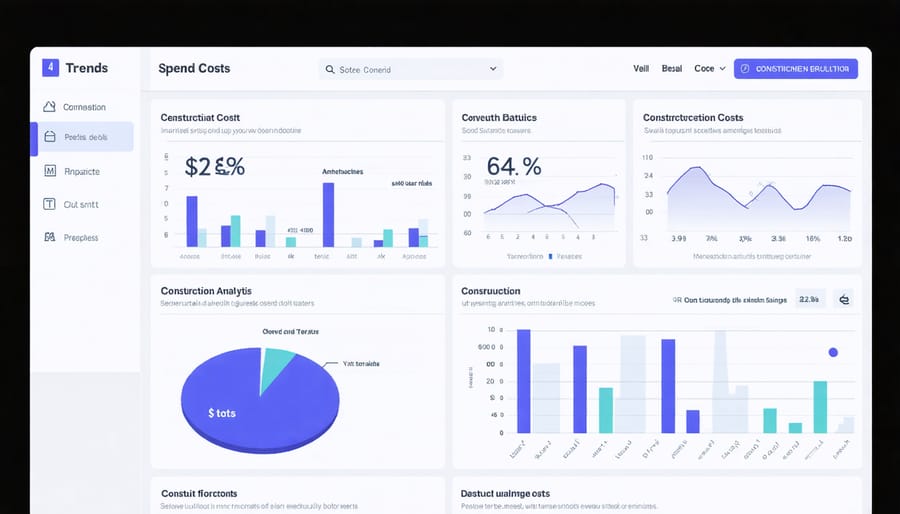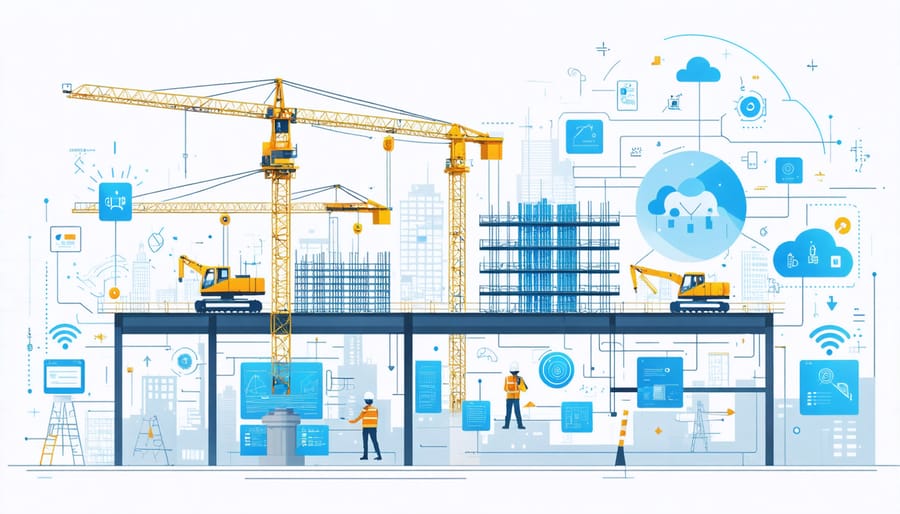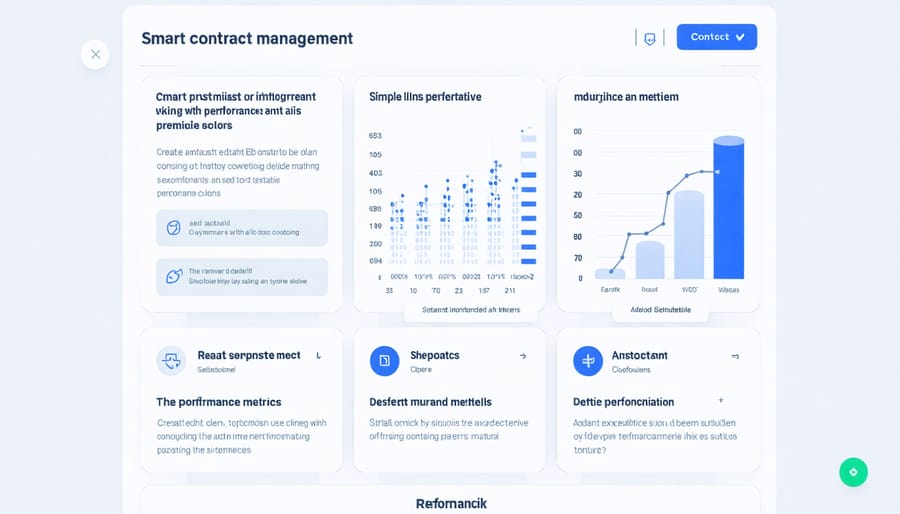Transform your procurement operations with strategic sourcing’s systematic approach to vendor selection, cost optimization, and supply chain resilience. In today’s construction landscape, where 5G technology is revolutionizing project delivery and supplier communications, mastering these seven strategic sourcing steps has become crucial for maintaining competitive advantage and operational excellence.
Leading construction firms leverage strategic sourcing to reduce procurement costs by 12-15% while strengthening supplier relationships and ensuring consistent material quality. This methodical framework, when integrated with emerging 5G capabilities, enables real-time supplier collaboration, automated inventory management, and predictive analytics for demand forecasting.
The following seven-step methodology synthesizes traditional strategic sourcing principles with modern digital transformation requirements, specifically tailored for construction procurement professionals navigating the industry’s technological evolution. Each step incorporates both proven procurement practices and innovative 5G-enabled solutions, providing a comprehensive roadmap for optimizing your sourcing strategy.
Whether managing complex infrastructure projects or coordinating multiple supplier relationships, these strategic sourcing steps deliver measurable improvements in procurement efficiency, cost savings, and supply chain transparency. The integration of 5G technology throughout this process ensures your sourcing strategy remains future-ready and aligned with construction’s digital transformation.
Spend Analysis in the 5G Era
Real-time Cost Tracking
The implementation of 5G-enabled tracking systems has revolutionized spend visibility in construction procurement. This advanced technology enables project managers to monitor costs across multiple sites and suppliers in real-time, providing unprecedented control over expenditure and resource allocation.
With 5G’s ultra-low latency and high-bandwidth capabilities, construction firms can now track material deliveries, equipment utilization, and labor costs instantaneously. Smart sensors and IoT devices deployed across the construction site transmit data to centralized procurement dashboards, allowing procurement teams to identify cost variances and potential overruns before they impact the project budget.
Real-time cost tracking through 5G infrastructure also facilitates immediate supplier performance evaluation and automated invoice reconciliation. Project managers can verify delivered quantities against purchase orders instantly, reducing payment cycles and strengthening supplier relationships. The system’s predictive analytics capabilities help identify spending patterns and opportunities for cost optimization, enabling more informed decision-making in future sourcing strategies.
Construction companies implementing these systems report an average of 15-20% reduction in procurement costs and a 30% improvement in budget accuracy. This enhanced visibility enables proactive rather than reactive cost management, ensuring projects stay within budget constraints while maintaining quality standards.

Predictive Analytics Integration
The integration of 5G networks has revolutionized predictive analytics in construction, particularly in strategic sourcing. By leveraging high-speed, low-latency 5G connectivity, construction firms can now analyze vast amounts of procurement data in real-time, enabling more accurate spend forecasting and pattern recognition.
This advanced capability allows procurement teams to anticipate material price fluctuations, identify potential supply chain disruptions, and optimize inventory levels with unprecedented precision. For example, by analyzing historical pricing data, weather patterns, and market indicators, the system can predict optimal purchasing windows for bulk materials like concrete and steel.
The technology also enables dynamic supplier performance tracking, automatically flagging potential risks and opportunities. Real-time data streams from multiple sources, including IoT sensors and market indicators, feed into sophisticated algorithms that continuously refine procurement strategies. This proactive approach helps organizations reduce costs, minimize waste, and maintain consistent material flow to construction sites.
Implementation typically requires integration with existing procurement systems and careful calibration of predictive models to account for project-specific variables and regional market conditions.
Market Research Enhancement Through 5G
Digital Supplier Discovery
In today’s digital landscape, 5G-powered platforms are revolutionizing supplier discovery and evaluation processes in construction procurement. These advanced platforms leverage high-speed connectivity and real-time data processing to create comprehensive supplier databases that can be accessed and analyzed instantly.
Construction firms can now utilize sophisticated digital marketplaces that offer detailed supplier profiles, including past project performance, certification status, and financial stability metrics. The enhanced bandwidth of 5G enables seamless streaming of virtual facility tours and live video demonstrations of supplier capabilities, allowing procurement teams to conduct preliminary assessments without physical site visits.
AI-powered analytics tools integrated into these platforms help evaluate suppliers based on multiple criteria simultaneously, including pricing competitiveness, delivery reliability, and quality standards. Real-time collaboration features enable procurement teams to share findings and make informed decisions faster than ever before.
Modern supplier discovery platforms also incorporate blockchain technology for verified supplier credentials and performance history, ensuring transparency and reducing the risk of fraudulent claims. This digital transformation in supplier identification has significantly reduced the time and resources traditionally required for supplier research and validation while improving the quality of supplier selection outcomes.
Market Intelligence Automation
Market intelligence automation leveraging 5G networks represents a transformative approach to construction procurement. Advanced AI-powered platforms can now analyze vast amounts of supplier data, market trends, and pricing information in real-time, enabling faster and more informed decision-making. These systems continuously monitor material costs, supplier performance metrics, and market dynamics across global supply chains.
Construction firms implementing 5G-enabled market intelligence tools report up to 30% improvement in procurement efficiency and significant cost savings through better timing of purchases. The high-speed, low-latency capabilities of 5G networks allow for instantaneous updates on supplier capacity, material availability, and price fluctuations.
Key features of modern market intelligence automation include predictive analytics for material price forecasting, automated supplier risk assessment, and real-time market opportunity identification. The system can alert procurement teams to potential supply chain disruptions, alternative sourcing options, and optimal purchasing windows.
For maximum effectiveness, these tools should be integrated with existing enterprise resource planning (ERP) systems and project management platforms. This integration ensures that market intelligence directly influences procurement strategies and helps maintain competitive advantages in rapidly evolving construction markets.
Strategy Development with Connected Systems
Cross-functional Integration
The integration of 5G technology has revolutionized cross-functional collaboration in strategic sourcing, enabling real-time communication and decision-making across diverse stakeholder groups. Construction organizations are now leveraging high-speed connectivity to create virtual war rooms where procurement teams, project managers, architects, and suppliers can collaborate seamlessly.
This enhanced connectivity facilitates immediate data sharing and analysis, allowing stakeholders to make informed decisions quickly. For instance, when evaluating potential suppliers, team members can simultaneously access and review bid documents, technical specifications, and performance metrics from different locations, streamlining the evaluation process.
The implementation of 5G-enabled collaborative platforms has reduced decision-making cycles by up to 60% in many construction projects. These platforms support virtual site visits, remote inspections, and real-time design modifications, ensuring all stakeholders remain aligned throughout the sourcing process.
To maximize cross-functional integration, organizations should establish clear communication protocols, define roles and responsibilities, and implement regular virtual touchpoints. This structured approach, combined with 5G capabilities, creates a robust framework for unified strategy development and execution across all project phases.
Real-time Strategy Adjustment
The integration of 5G technology has revolutionized real-time strategy adjustment in construction sourcing, enabling procurement teams to respond swiftly to market changes and supply chain disruptions. Through high-speed connectivity and minimal latency, 5G facilitates instant data analysis and decision-making across multiple sourcing parameters.
Construction firms can now monitor supplier performance, material costs, and delivery schedules in real-time, allowing for immediate strategy refinement. For example, when material prices fluctuate or supply chain bottlenecks emerge, procurement managers can quickly identify alternative suppliers or adjust ordering patterns to maintain project timelines and budget constraints.
Smart sensors and IoT devices, powered by 5G networks, provide continuous feedback on inventory levels, material quality, and supplier compliance. This data streams directly into procurement platforms, triggering automated alerts when predefined thresholds are breached or when market conditions necessitate strategic pivots.
The technology also enables virtual collaboration between stakeholders, facilitating rapid consensus-building on strategy adjustments. Project teams can conduct remote supplier assessments, negotiate contracts, and modify sourcing strategies without geographical limitations, significantly reducing response times to market changes.

Implementation of IoT-enabled Sourcing
Smart Contract Management
The integration of 5G technology has revolutionized contract management in construction procurement, enabling real-time monitoring and automated execution of supplier agreements. Smart contracts, powered by blockchain technology and enhanced by 5G connectivity, provide unprecedented transparency and efficiency in managing supplier relationships. These digital agreements automatically execute, verify, and enforce contractual terms, reducing administrative overhead and potential disputes.
Construction firms implementing smart contracts report significant improvements in payment processing, compliance monitoring, and supplier performance tracking. When combined with IoT-enabled inventory management systems, these contracts can automatically trigger orders, payments, and delivery confirmations based on predefined conditions.
Key benefits include automated milestone payments, real-time contract modifications, and instant verification of delivery terms. The system’s ability to integrate with existing procurement platforms ensures seamless documentation and audit trails. Construction managers can monitor contract execution through mobile dashboards, receiving instant notifications of any deviations or compliance issues. This technological advancement has reduced contract administration time by up to 70% while significantly minimizing errors and disputes in supplier agreements.
Automated Procurement Processes
The integration of 5G technology is revolutionizing how construction firms approach their digital procurement transformation, enabling unprecedented levels of automation and efficiency. Real-time data processing capabilities now allow procurement teams to automate routine purchasing decisions, inventory management, and supplier communications with remarkable precision.
Advanced IoT sensors and 5G connectivity enable automated inventory tracking systems that trigger purchase orders when materials reach predetermined thresholds. This predictive procurement approach minimizes delays and reduces carrying costs while ensuring continuous project flow. Smart contracts, powered by blockchain technology and facilitated by 5G networks, automatically execute agreements when predefined conditions are met, streamlining the entire procurement cycle.
Construction firms implementing these automated systems report up to 30% reduction in procurement processing times and a 25% decrease in administrative costs. The high-speed, low-latency characteristics of 5G networks ensure that these automated processes operate seamlessly across multiple construction sites and supply chain nodes, maintaining real-time synchronization of procurement activities with project schedules and resource requirements.
Negotiation in the Digital Age
Virtual Negotiation Platforms
The integration of 5G technology has revolutionized virtual negotiation platforms in construction procurement, enabling real-time collaboration and enhanced decision-making capabilities. These platforms now support ultra-high-definition video conferencing with negligible latency, allowing procurement teams to conduct detailed material inspections and supplier evaluations remotely.
Construction firms are leveraging 5G-powered virtual negotiation rooms equipped with augmented reality features, enabling stakeholders to examine 3D models of construction materials and components during negotiations. This technological advancement has significantly reduced travel costs and accelerated the sourcing process while maintaining the quality of supplier relationships.
The enhanced bandwidth and reliability of 5G networks support simultaneous multi-party negotiations with suppliers across different geographical locations. Procurement teams can now access real-time market data, conduct instant price comparisons, and share large technical specifications seamlessly during negotiation sessions.
Case studies from leading construction companies demonstrate that virtual negotiation platforms have reduced procurement cycle times by up to 40% while improving supplier relationship management through more frequent and meaningful interactions. These platforms also maintain detailed digital records of all negotiations, ensuring transparency and compliance throughout the sourcing process.

Real-time Data Access
Real-time market intelligence has revolutionized the strategic sourcing landscape in construction procurement. Today’s digital platforms enable procurement teams to access live pricing data, supplier performance metrics, and market trends during crucial negotiation phases. This immediate access to information strengthens your negotiating position and helps make data-driven decisions on the spot.
Construction companies can leverage real-time analytics dashboards to monitor material costs, labor rates, and equipment availability across different regions and suppliers. When negotiating with vendors, having instant access to comparative pricing and market conditions allows procurement teams to validate quotes, identify cost-saving opportunities, and respond quickly to market fluctuations.
For example, during steel procurement negotiations, real-time data can alert teams to sudden price changes in the metals market or reveal alternative suppliers with more competitive rates. This dynamic information flow also enables better risk management by highlighting potential supply chain disruptions or vendor capacity issues before they impact project timelines.
To maximize the benefits of real-time data access, procurement teams should establish clear protocols for data interpretation and decision-making thresholds, ensuring consistent application across all sourcing activities.
Contract Implementation and Management

Digital Contract Tracking
Modern contract tracking has evolved significantly with the integration of 5G technology, enabling real-time monitoring and enhanced compliance management across construction projects. These advanced systems leverage high-speed connectivity to maintain continuous oversight of supplier agreements, delivery schedules, and performance metrics. The implementation of smart contracts in construction has further streamlined this process, automatically enforcing terms and conditions while maintaining an immutable record of all transactions.
5G-enabled tracking systems provide immediate alerts for potential breaches, delayed deliveries, or quality issues, allowing procurement teams to take proactive measures. These platforms typically feature automated compliance dashboards, real-time performance analytics, and integrated document management capabilities. Construction firms implementing these systems report up to 40% reduction in contract disputes and a 25% improvement in supplier compliance rates.
Key features include automated milestone tracking, digital signatures with blockchain verification, and AI-powered risk assessment tools that predict potential contractual issues before they escalate. This technological framework ensures transparency while reducing administrative overhead and minimizing the risk of human error in contract management.
Performance Analytics
Real-time performance analytics has revolutionized how construction companies evaluate and manage supplier relationships. Modern analytics platforms integrate data streams from multiple sources, including delivery timestamps, quality inspection reports, and compliance documentation, providing a comprehensive view of supplier performance.
Key performance indicators (KPIs) should focus on critical metrics such as on-time delivery rates, material quality consistency, pricing adherence, and response times to urgent requests. Advanced analytics tools can automatically flag performance issues, enabling procurement teams to address concerns proactively before they impact project timelines.
Dashboard visualization tools present performance data in easily digestible formats, allowing stakeholders to make informed decisions quickly. These systems can track historical performance trends, predict potential supply chain disruptions, and identify opportunities for supplier development.
Regular performance reviews, supported by concrete data, facilitate more productive discussions with suppliers and help establish accountability. This data-driven approach enables construction companies to maintain optimal supplier relationships, negotiate better terms, and ensure continuous improvement in their supply chain operations.
Continuous Improvement Through 5G Analytics
The integration of 5G analytics into strategic sourcing processes enables construction companies to implement robust continuous improvement protocols through real-time data analysis and automated feedback mechanisms. This technological advancement allows procurement teams to monitor supplier performance, material quality, and delivery efficiency with unprecedented precision.
By leveraging 5G-enabled sensors and IoT devices throughout the supply chain, organizations can collect and analyze vast amounts of data to identify patterns, predict potential disruptions, and optimize sourcing decisions. This enhanced connectivity facilitates more accurate supply chain risk assessment and proactive problem-solving.
Real-world implementation shows significant benefits: Construction firms utilizing 5G analytics report up to 30% reduction in procurement cycle times and a 25% improvement in supplier performance metrics. The technology enables automated performance tracking through key performance indicators (KPIs) such as on-time delivery rates, quality compliance, and cost variance.
To maximize the benefits of 5G analytics, organizations should:
– Establish clear metrics and benchmarks for supplier performance
– Implement automated data collection points across the supply chain
– Develop responsive feedback mechanisms for suppliers
– Create standardized processes for data analysis and action planning
– Regular review and adjustment of sourcing strategies based on analytical insights
The continuous improvement cycle powered by 5G analytics ensures that strategic sourcing decisions remain dynamic and responsive to changing market conditions. This data-driven approach enables procurement teams to make informed decisions quickly, maintain competitive advantage, and drive sustainable improvements in their sourcing operations.
The integration of 5G technology into strategic sourcing represents a transformative shift in how construction companies approach procurement and supplier relationships. As we’ve explored throughout these seven steps, 5G enables faster decision-making, enhanced real-time collaboration, and more efficient supply chain operations. The technology’s ultra-low latency and high-bandwidth capabilities are revolutionizing everything from initial market analysis to final contract management.
Looking ahead, the construction industry can expect 5G to further streamline strategic sourcing through advanced IoT integration, automated procurement processes, and enhanced digital twin capabilities. Early adopters are already reporting significant improvements in supplier communication, inventory management, and cost optimization. Industry experts predict that by 2025, 5G-enabled strategic sourcing will become the standard rather than the exception.
However, successful implementation requires careful planning and a structured approach. Organizations must invest in the right infrastructure, train their procurement teams, and develop clear protocols for data security and management. The return on investment is compelling – companies implementing 5G-enabled strategic sourcing report average cost savings of 15-20% and procurement cycle time reductions of up to 30%.
As technology continues to evolve, construction companies that embrace these seven strategic sourcing steps while leveraging 5G capabilities will gain a significant competitive advantage. The future of construction procurement lies in this powerful combination of strategic methodology and cutting-edge technology.

